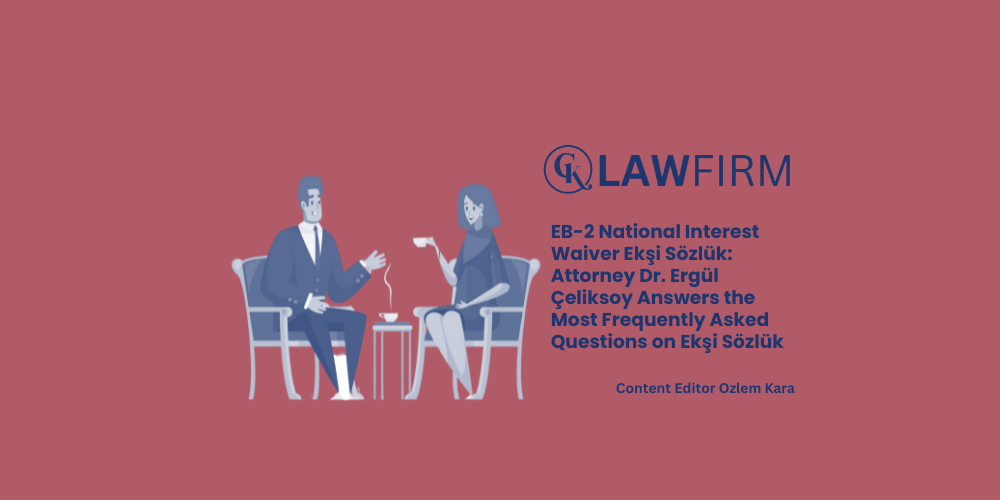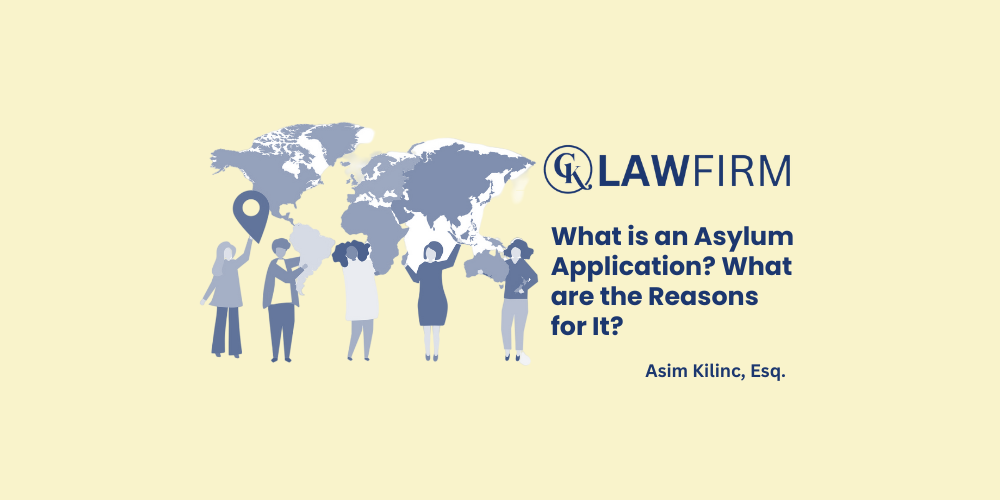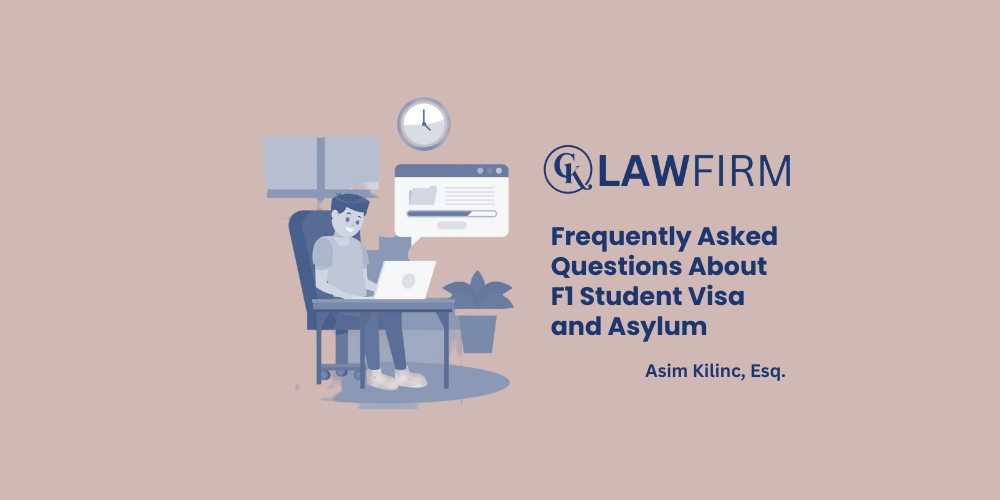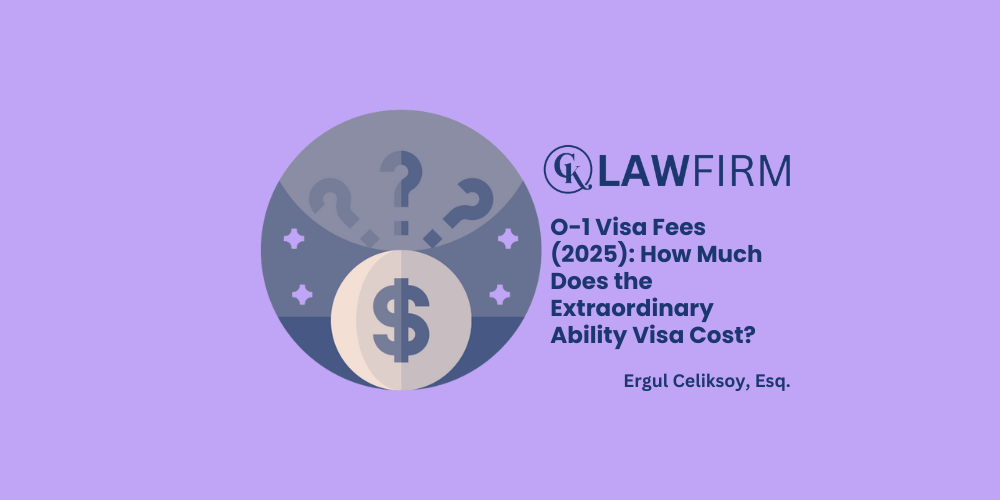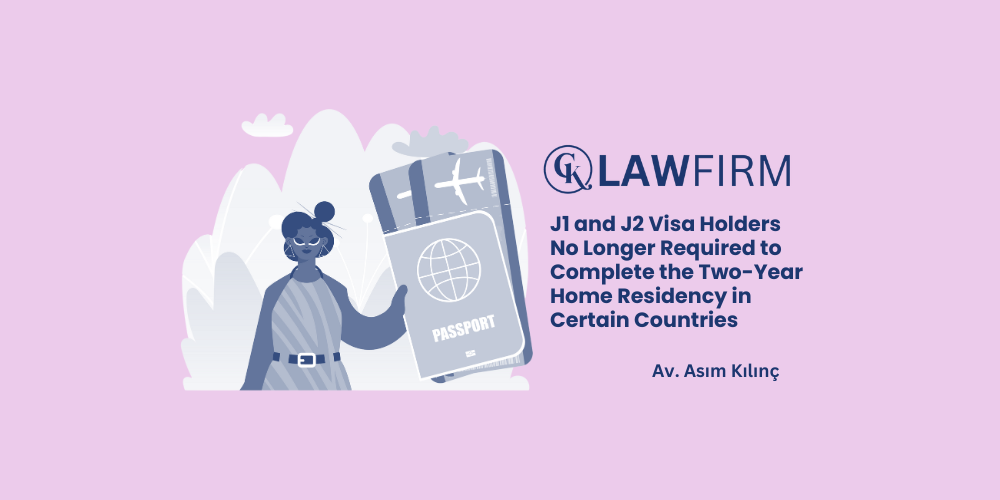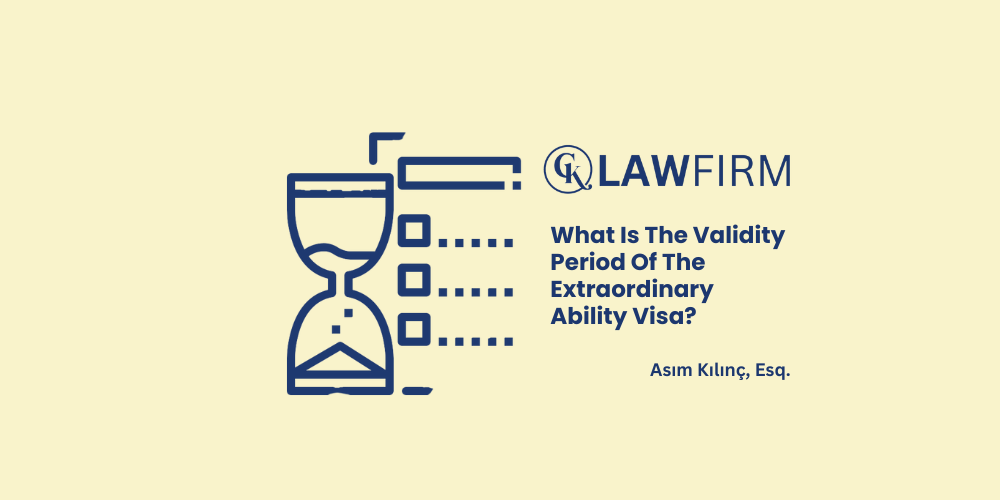Schedule an Appointment with Our Attorneys Now
By Ozlem Kara, Content Editor at CK Law Firm
CK Law Firm’s content editor Özlem Kara and CK Law Firm’s co-founder specializing in the EB-2 National Interest Waiver visa, Attorney Ergül Çeliksoy, came together on Ekşi Sözlük to answer the most frequently asked questions about the EB-2 NIW visa. We thank Ergül Çeliksoy for the enjoyable interview.
After reading our interview with Mr. Ergül, you will find answers to the following questions:
- What is the EB-2 National Interest Waiver?
- What are the Advantages of the EB-2 National Interest Waiver Visa?
- Who Can Apply for the EB-2 National Interest Waiver?
- What Conditions Must You Meet to Apply for the EB-2 National Interest Waiver?
- How Does the EB-2 National Interest Waiver Application Process Proceed?
- How Much Do You Have to Pay USCIS to Apply for the EB-2 National Interest Waiver?
- What Awaits You After Applying for the EB-2 National Interest Waiver Visa?
Hello Mr. Ergül, we would like to get to know you and your career better. Can you tell us about yourself?
Certainly. In 2017, I completed my master’s degree in international law and human rights law at the University of Nottingham, and then I began my doctoral studies at the same university. In 2022, I earned my doctorate in law from the University of Nottingham School of Law. Through my publications, research, and articles in my field, I gained international recognition. I have dealt with many cases and now, with the experience I have gained, I offer effective and solution-oriented services to my clients at CK Law Firm, helping them with their new lives.
Mr. Ergül, the EB-2 NIW visa is popularly known as the academic visa. So, what exactly is the EB-2 National Interest Waiver visa?
The EB-2 NIW visa is designed to allow individuals who are experts in their field to come to the United States to continue their professional lives and contribute to the country. It is not just for academics; nearly anyone who has made significant contributions in their field and has been highly successful can apply for this visa. The visa supports the brain drain of successful individuals. The EB-2 National Interest Waiver (NIW) visa allows you to apply for a Green Card without the need for a sponsor or employer. With this visa, you can gain the right to live and work in the United States, and apply for citizenship after 5 years. Additionally, if you obtain this visa, your spouse and children under 21 can also live in the United States and apply for citizenship.
You mentioned that highly successful individuals can apply. What kind of success is required, and who can apply for the EB-2 NIW visa?
Although the EB-2 NIW visa is popularly known as the “academic visa,” this is not entirely accurate. The visa does not focus on the profession but rather on the applicant’s significant success and the ability to demonstrate it with documentation.
What advantages does the EB-2 National Interest Waiver visa offer over other visa types?
One of the main advantages of the EB-2 visa is that you do not need a job offer or sponsor from the United States. Additionally, unlike other visa types, you do not need to invest or have a large sum of money in your bank account. Furthermore, this visa allows you to obtain a Green Card.
Mr. Ergül, you mentioned that you do not need a large sum of money or to be from a specific profession to apply for the EB-2 NIW visa. What are the requirements to apply for the EB-2 NIW visa?
As I briefly mentioned above, the primary philosophy of the EB-2 NIW visa is to encourage brain drain. Therefore, individuals who are experts and have achieved success in their fields can apply for this visa. There are three main criteria for the EB-2 NIW visa:
- You must have a master’s or doctoral degree in your field. If you have a bachelor’s degree, you must have at least five years of experience in your field.
- You must demonstrate that you will make a positive contribution to the United States. This means you must show that you will continue to work in your field of expertise when you move to the United States with this visa.
- You must be an expert and competent in your field. You can demonstrate this with reference letters, presentations, published articles, and media coverage about you.
“Each applicant is evaluated based on their file”
How do you apply for the EB-2 National Interest Waiver visa? What is the process?
Remember that each applicant is evaluated based on their file. Therefore, when applying, you must thoroughly demonstrate that you meet the criteria with evidence. You should prepare a comprehensive application petition and include documents (conference presentations, news articles, published papers, citations, diplomas, transcripts, reference letters, interviews, certificates, etc.) in your file to prove that you meet the criteria. Additionally, there are some forms that need to be added to your application file. These forms vary depending on whether you are following the process from Turkey – or outside the U.S. – or from within the U.S.
Steps to Follow if You Are Tracking the Process from Turkey:
- You must fill out the I-140 form available on the USCIS Immigration Office website.
- Then, select option 1a in Section 4 of the I-140 form.
- Afterwards, since the U.S. Embassy in Ankara is the only authority for immigration processes in Turkey, select Ankara in option 1b and Turkey in option 1c.
Steps to Follow if You Are Tracking the Process from the U.S.:
- When filling out the Processing Information section in Section 4 of the I-140 form, select option 2a. This allows you to apply for a Green Card through Adjustment of Status from within the U.S. after your EB-2 NIW visa is approved by the Immigration Office.
- In addition to the I-140 form, there is also a form called ETA 9089 Application for Permanent Employment Certification. You must fill out sections J, K, L, and M of this form. The latest version of this form is available on the Department of Labor’s website.
What is the fee that applicants need to pay during the entire application process?
The total fee of $1,015 will be collected from you in two different installments. These fees are as follows:
- I-140 Filing Fee: $715
- Asylum Program Fee: $300
Mr. Ergül, is it possible to speed up the visa application process?
If you opt for Premium Processing, your application will be processed by USCIS within as little as 15 business days. If you do not choose this option, it may take 6-8 months for your file to be processed.
What steps should be followed after applying for the visa?
After your application is received by the Immigration Office, the office will send you a Receipt Notice confirming that your application has been received. This document is very important, and you should keep it in your records. This document will provide you with a Priority Date, which is crucial because it determines the earliest date you can begin the Green Card process if your application is approved. Additionally, this document will contain a Receipt Number, which is a number assigned to your application. You can use this number to check the status of your application at any time by visiting the USCIS Case Status site. Once your EB-2 NIW visa is approved by the Immigration Office, the Green Card process begins. After receiving approval from this visa, you need to apply for a Green Card. After obtaining your Green Card, you will be eligible to apply for U.S. citizenship after five years.
Mr. Ergül, you have clarified the frequently asked questions by Ekşi Sözlük users regarding the EB-2 National Interest Waiver visa. To summarize, what would you like to say about the EB-2 NIW process?
In conclusion, although the EB-2 National Interest Waiver Visa involves many details that must be carefully considered throughout the process, it is an excellent option for realizing your American dreams. Our clients who wish to apply for this visa can learn whether they are eligible for the EB-2 NIW by contacting us at cklawfirm.org, emailing eb2@cklawfirm.org, or reaching out to me directly on LinkedIn for a free consultation.
By Asim Kilinc, Immigration Attorney at CK Law Firm
Today, there are multiple ways to study, live, work, or settle in the United States. Among these, the concept of asylum and the reasons for applying for asylum frequently come up. In this article, we will discuss:
- What is an Asylum Application?
- Reasons for Asylum
If you have any other questions related to this topic, please don’t hesitate to reach out via the comments section below this article, send me a direct message on LinkedIn, or contact me through the CK Law Firm Immigration Law Firm’s website, where I am a co-founder.
What is an Asylum Application?
An asylum application is the process where a person seeks protection in another country due to persecution or the risk of persecution in their own country. To be accepted, specific criteria must be met. An asylum application is a protection method used by individuals whose lives are in danger, whose basic human rights have been violated, or who have faced persecution. Asylum is a process regulated by international law that requires states to provide protection under certain conditions to those seeking asylum. The primary goal of this application is to ensure the applicant’s safety and the protection of their human rights.
To be accepted, the persecution the applicant has faced must be evaluated according to specific criteria. Persecution is defined as serious violations and mistreatment that threaten a person’s life, freedom, or security. These violations can be carried out by state or non-state actors. When evaluating an asylum application, the type, continuity, intensity of persecution, and the reasons why the applicant is fleeing from this persecution are considered.
Reasons for Asylum
Here are some fundamental reasons a person might apply for asylum:
- Persecution Due to Race
- Persecution Due to Religion
- Persecution Due to Nationality
- Persecution Due to Membership in a Particular Social Group
- Persecution Due to Political Opinion
- Gender-Based Persecution
- Persecution Due to Environmental Disasters and Climate Change
- Persecution Due to Race
A person may apply for asylum due to discrimination, violence, and other forms of mistreatment they face because of their race. Racial persecution can manifest in various ways, such as physical attacks, discriminatory practices, and racist rhetoric. For example, individuals belonging to a specific ethnic group may be systematically targeted by members of the majority group, fired from their jobs, denied education rights, or restricted access to social services. Such discrimination and violence can endanger the person’s life and force them to flee the country.
- Persecution Due to Religion
Restrictions on religious freedom, discrimination against individuals belonging to specific religious groups or beliefs, and persecution based on religion are also grounds for asylum. For example, members of a minority religious group in a country may face the destruction of their places of worship, bans on religious rituals, forced conversion attempts, and even imprisonment or execution due to their religious beliefs. These threats can prevent a person from living according to their religious beliefs and force them to seek refuge in a safer place.
- Persecution Due to Nationality
Discrimination and persecution due to nationality or ethnic origin can lead to an asylum application. For example, individuals belonging to ethnic minorities in a country may be systematically oppressed by majority groups, forcibly displaced, or subjected to ethnic cleansing. Nationality-based persecution can severely threaten individuals’ physical and psychological health.
- Persecution Due to Membership in a Particular Social Group
Persecution faced by a person due to their membership in a particular social group can be grounds for an asylum application. These social groups may include individuals who face discrimination due to their sexual orientation, gender identity, professions, or specific social roles. For example, LGBTQ+ individuals may face severe discrimination and violence in many countries, lack social acceptance, and even face legal punishment. Similarly, individuals working in certain professions (journalists, human rights defenders, etc.) may face pressure, threats, and attacks.
- Persecution Due to Political Opinion
Persecution faced due to political opinions or activities is a significant reason for an asylum application. A person’s criticism of the government, opposition activities, or membership in a particular political party can make them a target of the government or other political groups. For example, an opposition journalist in a country may be imprisoned, tortured, or killed due to their writings criticizing government policies. Political activists may be arrested or threatened with their families for participating in protest demonstrations.
- Gender-Based Persecution
Gender-based persecution includes violence and oppression faced by women or individuals discriminated against due to their gender identity. For example, women in a country may be forcibly married, subjected to domestic violence, or denied education and work rights. Similarly, individuals discriminated against due to their gender identity may face violence, sexual assault, and social exclusion.
- Persecution Due to Environmental Disasters and Climate Change
In recent years, the number of people displaced due to climate change and environmental disasters has increased. Natural disasters such as droughts, floods, and hurricanes can make living conditions unsustainable and force people to migrate. Additionally, the depletion of resources due to such disasters can trigger social conflicts, forcing people to flee these conflicts.
Conclusion
When applying for asylum, it is essential to document the persecution faced and the reasons for it in detail. Since each individual’s situation is unique, the asylum application requires a detailed assessment of personal experiences. Therefore, it is crucial for those applying for asylum to clearly and accurately describe their experiences and provide as much evidence as possible. Obtaining professional legal advice during the asylum application process can increase the chances of success and help protect the applicant’s rights. For more information and support, please do not hesitate to contact CK Law Firm Immigration Law Firm through our website, at info@cklawfirm.org, or directly via LinkedIn.
Who is Attorney Asim Kilinc?
Attorney Asim Kilinc is a co-founder of CK Law Firm and is known for his expertise in immigration law and U.S. asylum applications. Having completed his Master of Laws at Southern Methodist University Dedman School of Law, Kilinc is a member of the Missouri Bar and has a particular focus on U.S. immigration law.
With extensive knowledge and experience in immigration law, Attorney Kilinc significantly contributes to CK Law Firm’s success in this field. He has played an active role in preparing over 1,000 immigration cases, demonstrating his expertise. By providing comprehensive and professional legal support to his clients, he facilitates their adaptation to new lives in the United States.
Attorney Kilinc also possesses a broad knowledge base in U.S. asylum applications. He meticulously guides his clients throughout the process, ensuring they receive the best legal advice. He provides the highest quality service in citizenship, Green Card, work permits, and other immigration processes, supporting his clients from the beginning to U.S. citizenship.
By providing reliable and effective legal consultancy services, Attorney Asim Kilinc strengthens CK Law Firm’s leadership in immigration law and U.S. asylum applications, standing by his clients in their journey to build a new life in the United States.
By Asim Kilinc, Immigration Attorney at CK Law Firm
In today’s world, there are multiple ways to study, live, work, or settle in the United States. In this article, I will address the asylum application process for F1 Student Visa holders, a topic that I frequently encounter and receive many questions about. Drawing from the questions of dozens of clients whose cases I have handled, I believe this article will answer many questions that F1 visa holders may have about the asylum process. By reading this article, you will find answers to the following questions:
- Can I apply for asylum in the United States as an F1 visa holder?
- Can I apply for asylum after my F1 visa expires?
- What are the steps to apply for asylum with an F1 visa?
- Can I obtain a work permit after applying for asylum while holding an F1 visa?
- If my asylum application is denied, can I return to my F1 status?
- Can I continue my education after applying for asylum while holding an F1 visa?
- What are the advantages of applying for asylum with an F1 visa?
- Is it necessary to hire a lawyer when applying for asylum with an F1 visa?
- Can I include my family members when applying for asylum with an F1 visa?
- Can I marry a U.S. citizen and get a Green Card during the asylum process?
If you have any questions beyond those mentioned above, please feel free to contact me through the comments section below this article, send me a message directly on LinkedIn, or reach out through the CK Law Firm Immigration Attorneys website, where I am a founding partner.
Can I apply for asylum in the U.S. as an F1 visa holder?
Yes, as an F1 visa holder, you can apply for asylum in the U.S. Asylum is sought when you do not wish to return to your country due to persecution or fear of persecution. If you are in the U.S. on an F1 visa and are afraid to return to your country, you can legally apply for asylum. To be accepted, your fear of persecution must be credible and well-documented. This application should be supported by a well-thought-out strategy and preparation process.
Can I apply for asylum after my F1 visa expires?
Yes, you can apply for asylum after your F1 visa expires. However, you must apply for asylum within one year of entering the U.S. Applications submitted after this period are usually denied, so it is crucial to apply on time. However, if you have maintained your F1 status and the one-year period has passed, it will not pose a problem for the asylum application, as maintaining your status qualifies as an exception to the one-year rule.
What are the steps to apply for asylum?
The asylum application process includes:
- Creating a Strategy and Preparing the Application: Before starting the asylum application, a good strategy should be created, and necessary preparations should be made. In this phase, documents supporting the application should be collected, and a detailed application file should be prepared.
- Collection of Biometric Information: After applying, fingerprints will be taken, and biometric information will be collected. Attending this appointment is mandatory, and failure to do so may result in the denial of your work permit application.
- Interview: An interview will be conducted at the Immigration Office to evaluate your application. During this interview, an officer will ask you questions related to your application. It is essential to prepare with your lawyer before this interview.
Can I obtain a work permit after applying for asylum while holding an F1 visa?
Yes, you can obtain a work permit after applying for asylum while holding an F1 visa. You can apply for an Employment Authorization Document (EAD) 150 days after submitting your asylum application. Once you receive your work permit, you can start working legally. This permit is valid for five years after approval.
If my asylum application is denied, can I return to my F1 status?
If your asylum application is denied, it may not be possible to return to your F1 status. However, you can request an extension of your F1 visa to maintain your F1 status. This way, you can continue your education and retain your F1 status.
Can I continue my education after applying for asylum while holding an F1 visa?
Yes, you can continue your education after applying for asylum. There is no obstacle preventing asylum applicants from continuing their education. It is not necessary to maintain an F1 visa to continue your education. Even if your F1 visa expires, it will not be a problem. After obtaining a work permit through asylum, you can apply for certain special loans and borrow for tuition fees.
What are the advantages of applying for asylum with an F1 visa?
- Green Card Through Marriage: During your asylum process, you can marry a U.S. citizen and obtain a Green Card. After receiving the Green Card through marriage, you can withdraw your asylum application.
- Work Permit: You can apply for a work permit 150 days after submitting your asylum application and receive a five-year work permit.
- Permanent Residency: Once your asylum application is approved, you can apply for a Green Card and, later, if you meet the necessary conditions, become a U.S. citizen.
Is it necessary to hire a lawyer when applying for asylum with an F1 visa?
It is strongly recommended to hire a lawyer when applying for asylum with an F1 visa. The asylum application process is complex and requires legal knowledge. A lawyer can assist with preparing your application, submitting documents correctly, and guiding you through the interview process. Additionally, your lawyer can highlight the strengths of your application, increasing your chances of acceptance. Hiring a lawyer is an essential step that increases the likelihood of a successful application.
Can I include my family members when applying for asylum with an F1 visa?
Yes, you can include your spouse and unmarried children under 21 in your asylum application when applying with an F1 visa. These family members can join you in applying for asylum and benefit from the same protection. Having your family members submit supporting documents can increase the chances of your application being accepted.
Can I marry a U.S. citizen and get a Green Card during the asylum process?
Yes, you can marry a U.S. citizen and obtain a Green Card while your asylum process is ongoing. After receiving the Green Card through marriage, you can withdraw your asylum application. This process allows you to obtain permanent residency through marriage and stay legally in the U.S. When applying for a Green Card through marriage, you must provide the necessary documents and prove that the marriage is genuine. For more information and support, don’t hesitate to get in touch with me directly via LinkedIn, email me at info@cklawfirm.org, or visit the CK Law Firm Immigration Law Firm’s website!
Who is Attorney Asım Kılınç?
Attorney Asım Kılınç is the founding partner of CK Law Firm, known for his expertise in immigration law and U.S. asylum applications. Having completed his Master’s degree at Southern Methodist University Dedman School of Law, Kılınç is a member of the Missouri Bar and focuses on U.S. immigration law.
Attorney Kılınç has significantly contributed to CK Law Firm’s success in immigration law through his deep knowledge and experience in this field. He has actively played a role in preparing over 1,000 cases in immigration law, demonstrating his expertise. By providing comprehensive and professional legal support to his clients, he facilitates their adaptation to a new life in the U.S.
Attorney Kılınç also has extensive knowledge of U.S. asylum applications. He carefully guides his clients throughout the process, ensuring they receive the best legal counsel. He offers top-quality services in citizenship, Green Card, work permits, and other immigration processes, supporting his clients from the start until they become U.S. citizens.
Strengthening CK Law Firm’s leadership in immigration law and U.S. asylum applications, Attorney Asım Kılınç provides reliable and effective legal counseling services, supporting clients in their journey to establish a new life in the U.S.
By Ergul Celiksoy, Immigration Attorney at CK Law Firm
The O-1 visa, commonly known as the extraordinary ability visa, is a special type of visa granted to individuals who wish to work in the United States and possess exceptional talents in specific fields. This visa is suitable for applicants with above-average achievements in science, arts, entertainment, sports, and business. However, it is essential to be well-prepared before applying for an O-1 visa. One of the most critical factors to consider during preparation is understanding the O-1 visa fees. In this article, I will cover the following topics related to the O-1 visa cost:
- What Are the Requirements for the O-1 Visa?
- How Much Is the O-1 Visa Application Fee?
- Additional Costs During the O-1 Visa Application Process
- Is It Possible to Reduce O-1 Visa Costs?
In this post, I will provide detailed information on the O-1 visa fees and highlight key points you need to consider. If you have any further questions beyond the topics covered here, feel free to leave a comment on this blog or reach out to us through our website. For other inquiries, you can also contact me directly via LinkedIn.
What Are the Requirements for the O-1 Visa?
The O-1 visa requirements are primarily focused on the applicant’s ability to prove their extraordinary talent. At this point, the evidence required for the O-1A visa and the O-1B visa differs. For a detailed review of the O-1 visa, you can also check out our post titled “O-1 Visa Comments: A Beginner’s Guide.”
O-1A Visa Requirements
Applicants for the O-1A visa must meet specific criteria. Having some of the following qualifications can greatly improve the chances of a successful application:
- Possession of significant national or international awards or a career marked by winning such awards.
- Membership in associations or organizations that require outstanding achievements for admission.
- Publications or media coverage about the applicant’s achievements in professional journals, major commercial publications, or media outlets.
- Serving as a judge or panelist in evaluating the work of others in scientific, academic, or artistic fields.
- Original contributions or innovations in their field that have had a significant impact.
- Authorship of important scientific articles or industry reports.
- Holding critical roles in distinguished organizations and carrying significant responsibility.
- Earning a high salary or substantial compensation compared to others in their field.
O-1B Visa Requirements
Individuals applying for the O-1B visa must demonstrate extraordinary talent in arts, film, or television. Meeting some of the following criteria can qualify an applicant for this visa:
- Serving as a lead or starring role in distinguished productions or events, supported by reviews, promotional materials, contracts, or endorsements.
- Holding a significant or leading position in well-known organizations, with evidence from articles in newspapers, trade journals, or publications.
- Achieving national or international recognition, with coverage in major newspapers, trade magazines, or other professional publications.
- Demonstrating commercial success of their projects through ratings, box office earnings, or critical reviews.
- Receiving praise or recommendation letters from recognized experts, critics, or professional organizations.
- Having contracts or other reliable evidence showing that they command a high salary or significant financial compensation.

How Much Is the O-1 Visa Application Fee?
The answer to how much the O-1 visa costs depends on the basic application fees and additional service charges that applicants and sponsors are required to pay. The fees for sponsors may also vary depending on the type of organization. After the February 2024 fee changes, the O-1 visa fees are as follows:
Fees for Filing Form I-129:
- For U.S. non-profit organizations: $530
- For organizations with 25 or fewer full-time employees: $530 base fee plus a $300 Asylum Program fee, totaling $830
- For all other applicants: $1055 base fee plus a $600 Asylum Program fee, totaling $1655
Premium Processing Fee:
The fee for Premium Processing Service, used to expedite applications, is set at $2805 as of February 2024. This service is intended for urgent cases and reduces USCIS’s response time to 15 Federal business days.
Understanding these updated fees is crucial for planning your O-1 visa application. If you need further assistance or professional guidance to ensure a smooth application process, feel free to contact us.
Additional Costs During the O-1 Visa Application Process
The O1 visa fees are not limited to the petition fees paid to USCIS. Applicants may encounter additional costs during the application process, including:
- Consultation and Attorney Fees: Professional assistance from an immigration attorney can be crucial to ensure that the application is correctly and completely prepared. Attorney fees typically range from $2000 to $5000, depending on the firm and the scope of services provided.
- Visa Interview Fee: Applicants must pay a separate fee for the visa interview at the U.S. consulate. The interview fee is $190.
- Travel and Document Preparation Costs: Gathering documents, obtaining translations, and notarizing them can incur additional expenses. These costs vary depending on the applicant’s specific situation.
Is It Possible to Reduce O-1 Visa Costs?
It is possible to reduce O-1 visa costs by following certain strategies. Professional assistance during the application process can help avoid unnecessary expenses by ensuring that the documentation is complete and correct. Here are some tips for minimizing costs:
- Prepare Documents Accurately: If USCIS requests additional information or documents, the process may be delayed, and additional costs may arise. Preparing documents correctly before submission can help avoid these issues.
- Compare Consulting Firms: Working with experienced immigration attorneys or consulting firms can increase your chances of approval and reduce costs in the long run. Comparing the services and fees of different firms can help you find more affordable options.
- Consider Whether Premium Processing Is Necessary: While premium processing can expedite the process, it also adds significant cost. If you are not in urgent need of a decision, opting for the standard processing time can save money.
- Choose the Correct Category: The O-1 visa has different categories, and applying under the wrong category can result in rejection, leading to additional costs for reapplication. Seeking professional guidance can help ensure that you apply under the appropriate category.
Reducing O-1 visa costs is possible with careful planning and by taking the right steps. If you have any questions about the process, feel free to contact us through our website. You can also reach out to me directly on LinkedIn for personalized guidance.
The O-1 visa fees can vary depending on the basic application costs and additional expenses incurred during the process. Seeking professional support for your O-1 visa application can help streamline the process and reduce the risk of rejection. If you are planning to apply for an extraordinary ability visa, feel free to contact us for detailed information and assistance.
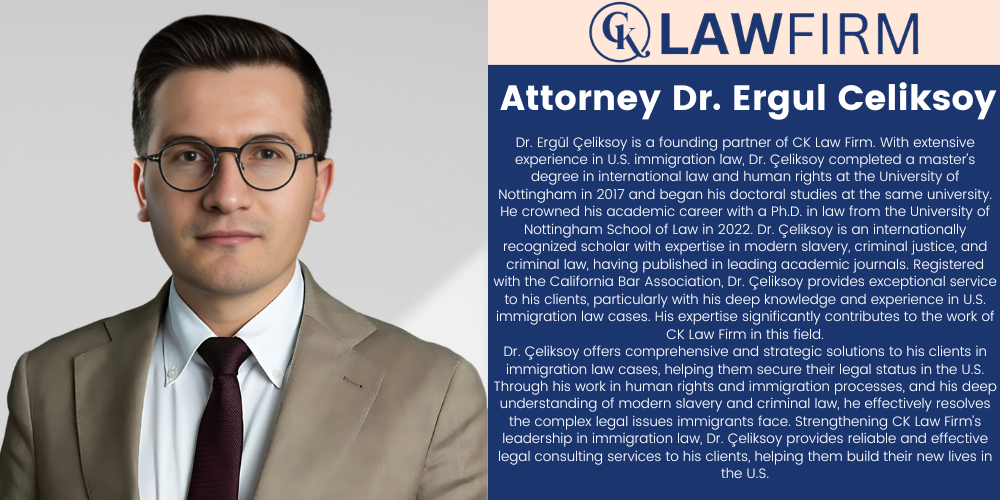
Asım Kılınç, Immigration Attorney, CK Law Firm
One of the most significant challenges for J1 visa holders has been the two-year home residency requirement, which mandated participants in academic, research, or cultural exchange programs to return to their home country for two years before applying for permanent residence or other nonimmigrant visas in the U.S. This rule has often left individuals unable to accept job offers, pursue career opportunities, or apply for Green Cards. However, with the U.S. Department of State’s recently updated Exchange Visitor Skills List, effective December 9, 2024, many J1 and J2 visa holders are no longer subject to this requirement. This update marks a monumental shift, providing new opportunities for scholars, researchers, and professionals from impacted countries.
What Is the Exchange Visitor Skills List?
The Exchange Visitor Skills List, published by the U.S. Department of State, identifies specific fields and countries whose J1 visa holders are required to return to their home country for at least two years. The purpose of this policy is to prevent brain drain by ensuring that individuals contribute their acquired skills to the economic and social development of their home nations.
The list is updated periodically and takes into account factors such as a country’s economic conditions, human resource development needs, and per capita income levels. Historically, fields such as engineering, medicine, information technology, agriculture, and education have been the focus of this list.
The 2024 Update: A Major Shift
The newly revised Exchange Visitor Skills List brings significant changes, with many countries being removed from the list. Among the key updates:
- Removal of Many Countries
Countries such as Turkey, India, China, Brazil, and South Korea are no longer included in the list. This means their J1 and J2 visa holders are no longer subject to the two-year home residency requirement. - Updated Criteria for Inclusion
Countries were reassessed based on updated economic metrics, such as per capita GDP, human capital development, and emigration rates. Nations with a per capita GDP above $7,500 are generally no longer included on the list. - No Changes to Eligible Fields
The fields listed in the Exchange Visitor Skills List, such as medicine, engineering, and education, remain the same as in previous versions.
What This Means for J1 and J2 Visa Holders
This update provides significant benefits for J1 visa holders and their dependents (J2 visa holders) from the countries removed from the list.
- No More Home Residency Requirement
J1 and J2 visa holders from removed countries, such as Turkey, India, and Brazil, are now free to remain in the U.S. without returning to their home country for two years after completing their program. - Simplified Green Card and Visa Transitions
Individuals can directly apply for permanent residency through categories such as EB2-NIW or EB1-A or transition to other visa types without being restricted by the two-year home residency requirement. - Increased Career Opportunities
Scholars, researchers, and professionals can now accept U.S.-based job offers, pursue promotions, and build their careers without disruptions.
Countries Removed from the List
As of December 9, 2024, the two-year home residency requirement no longer applies to J1 and J2 visa holders from the following countries:
- Albania
- Algeria
- Argentina
- Bahrain
- Bangladesh
- Bolivia
- Brazil
- Chile
- China
- Congo (Kinshasa)
- Costa Rica
- Dominican Republic
- Gabon
- Georgia
- Guyana
- India
- Indonesia
- Kazakhstan
- Laos
- Malaysia
- Mauritius
- Montenegro
- Namibia
- Oman
- Paraguay
- Peru
- Romania
- Saudi Arabia
- South Africa
- South Korea
- Sri Lanka
- Thailand
- Trinidad & Tobago
- Turkey
- United Arab Emirates
- Uruguay
Implications for Other Countries
For countries still included in the list, the two-year home residency requirement remains in effect. This means individuals from these nations must return home and fulfill the requirements before pursuing permanent residency or other visa options in the U.S.
Final Thoughts and Recommendations
Removing the two-year home residency requirement for J1 and J2 visa holders from certain countries is a game-changer for those seeking to advance their careers and lives in the U.S. However, those from countries still on the list should carefully evaluate their options.
Recommendations for J1 and J2 Visa Holders:
- Check Your Eligibility: Determine whether your country is included in the updated list and whether the requirement applies to you.
- Seek Advisory Opinions: If you are unsure, request an Advisory Opinion from the U.S. Department of State to clarify your case.
- Consult Immigration Experts: Work with experienced immigration attorneys to navigate your visa or residency transition effectively.
For personalized guidance and expert support in managing your immigration journey, contact CK Law Firm. Our team is here to help you achieve your goals and take full advantage of the latest policy changes.
Asım Kılınç, Immigration Attorney, CK Law Firm
The O-1 visa, commonly known as the extraordinary ability visa, allows individuals with exceptional skills in specific fields to live and work in the United States. It is specifically designed for professionals in science, education, business, arts, and athletics who have demonstrated significant achievements. While the O-1 visa provides a temporary opportunity to build a career in the U.S., many wonder if it is sufficient for long-term residence or if a green card is necessary. In this article, we will explore the connection between the O-1 visa and the green card, covering the following key topics:
- Types of O-1 Visas
- O-1 Visa Application Process
- Validity Period of the O-1 Visa
- O-1 Visa Extension Process and Required Documents
- Transition from O-1 Visa to Green Card
If you have any questions beyond the topics discussed here, feel free to reach out to us through the comment section or via the official CK Law Firm website. For personalized consultation, you can also contact me directly through LinkedIn.
Types of O-1 Visas
The O-1 visa is categorized based on the applicant’s field of expertise. Below are the main categories:
- O-1A Visa: Issued to individuals with extraordinary abilities in science, education, business, or athletics.
- O-1B Visa: Designed for those with exceptional talent in the arts or those recognized in the motion picture or television industry. This is often referred to as the O-1 artist visa.
- O-2 Visa: Granted to individuals assisting an O-1 visa holder during a specific event or performance.
- O-3 Visa: Issued to the spouse and unmarried children under 21 of an O-1 visa holder.
Each type of O-1 visa requires different documentation during the application process. Determining the right category for your situation is crucial, and seeking professional guidance can help streamline the process.
O-1 Visa Application Process
Applicants seeking an O-1 visa must provide substantial evidence of their extraordinary abilities. The basic steps in the application process are as follows:
- Finding a Sponsor: The O-1 visa cannot be obtained independently; a U.S.-based sponsor or employer must file the petition on behalf of the applicant. The sponsor submits the petition to USCIS (U.S. Citizenship and Immigration Services).
- Preparing the Necessary Documents: The sponsor’s petition must include evidence of the applicant’s extraordinary abilities, such as awards, publications, and notable professional achievements.
- Approval by USCIS: Once submitted, USCIS reviews the petition and either approves or denies the application. The processing time may vary depending on the completeness and accuracy of the documentation.
Validity Period of the O-1 Visa
Initially, the O-1 visa is granted for a period of three years. After the initial period, the visa can be extended in one-year increments as long as the applicant continues to meet the eligibility criteria. There is no maximum limit on the number of extensions, but each extension requires new supporting evidence.
During the validity of the O-1 visa, the holder can work in the U.S. only for the employer or project specified in the original petition. The law prohibits engaging in other jobs or projects without proper authorization.
O-1 Visa Extension Process and Required Documents
To extend the extraordinary ability visa, applicants must provide valid reasons and updated documentation. Key steps in the extension process include:
- Continued Sponsorship: The current sponsor must confirm that the applicant will continue working on the specified project or job. The sponsor submits a new petition to USCIS, which forms the basis for the extension request.
- New Evidence: Applicants must present updated evidence of their ongoing extraordinary contributions, such as additional awards, publications, or project involvement.
- Filing Form I-129: The sponsor must complete and submit Form I-129 (Petition for a Nonimmigrant Worker) to USCIS. This form is essential for officially initiating the extension process.
USCIS typically processes extension requests within two to three months. However, applicants can opt for premium processing, which guarantees a decision within 15 calendar days.
Transition from O-1 Visa to Green Card
For many O-1 visa holders, transitioning to a green card is a natural next step, especially for those seeking permanent residence in the U.S. While the O-1 visa offers temporary work authorization, renewing it annually can become burdensome. Therefore, many individuals prefer to apply for a green card through specific employment-based categories. Below are key details regarding the transition:
- EB-1 Visa Category: Most O-1 visa holders qualify for the EB-1 green card category. EB-1 (Employment-Based Immigration: First Preference) targets individuals who demonstrate extraordinary abilities in fields such as science, arts, education, business, or athletics. This category offers a faster path to permanent residency compared to other employment-based green card options.
- No PERM Requirement: Unlike other employment-based green card categories, EB-1 applicants are typically exempt from the PERM (Program Electronic Review Management) labor certification process. This exemption accelerates the application process, as the employer does not need to prove that there are no qualified U.S. workers available for the position.
- Filing Form I-140 and Form I-485: To apply for a green card, the applicant’s sponsor must first file Form I-140 (Immigrant Petition for Alien Worker) with USCIS. After USCIS approves this petition, the applicant files Form I-485 (Application to Register Permanent Residence or Adjust Status) to change their status from a nonimmigrant to a lawful permanent resident.
Successfully navigating the transition from an O-1 visa to a green card requires careful preparation and adherence to U.S. immigration laws. Seeking professional assistance can significantly improve the chances of a successful application.
If you are considering applying for a green card or need help with your O-1 visa(extraordinary ability visa), feel free to contact us through our website. For personalized guidance, you can also reach out via LinkedIn.
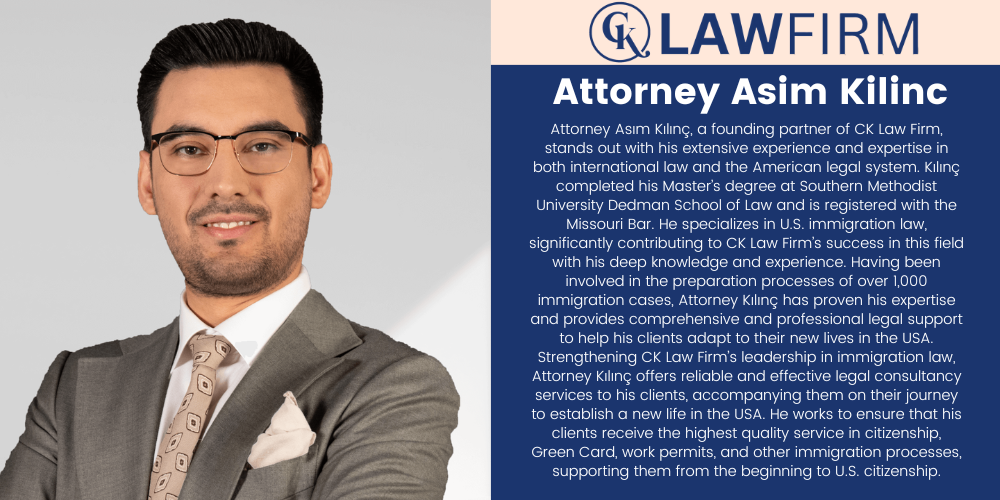
Subscribe to Our Newsletter
Subscribe to our newsletter to stay informed about the latest announcements and articles written by our attorneys on U.S. immigration processes.
Sobre Nosotros
Contáctanos
+1 (945) 527- 23 22
Correo electrónico
info@cklawfirm.org
Dirección
2800 Regal Rd #102, Plano, TX 75075

All Rights Reserved by CK Law Firm.


